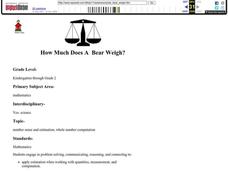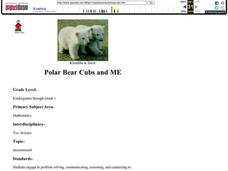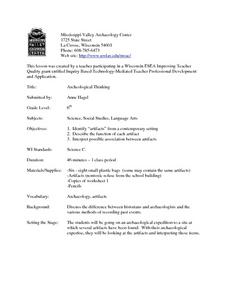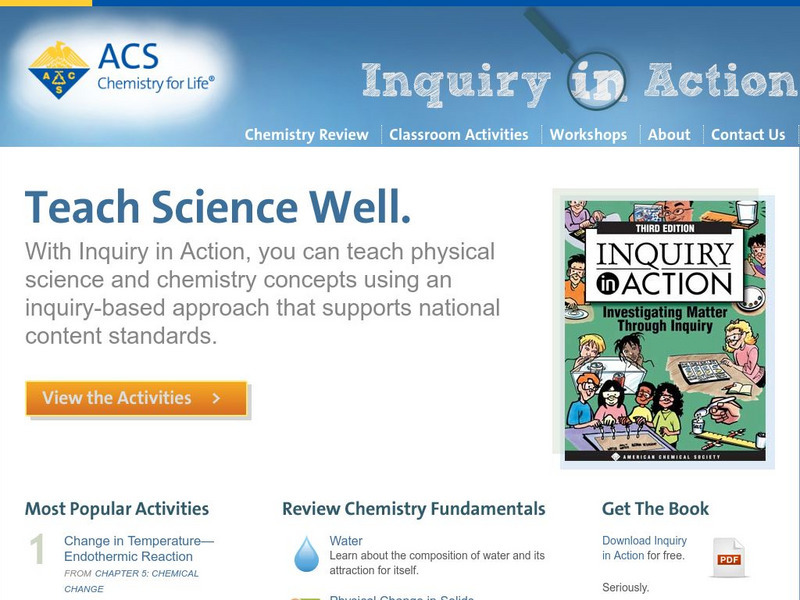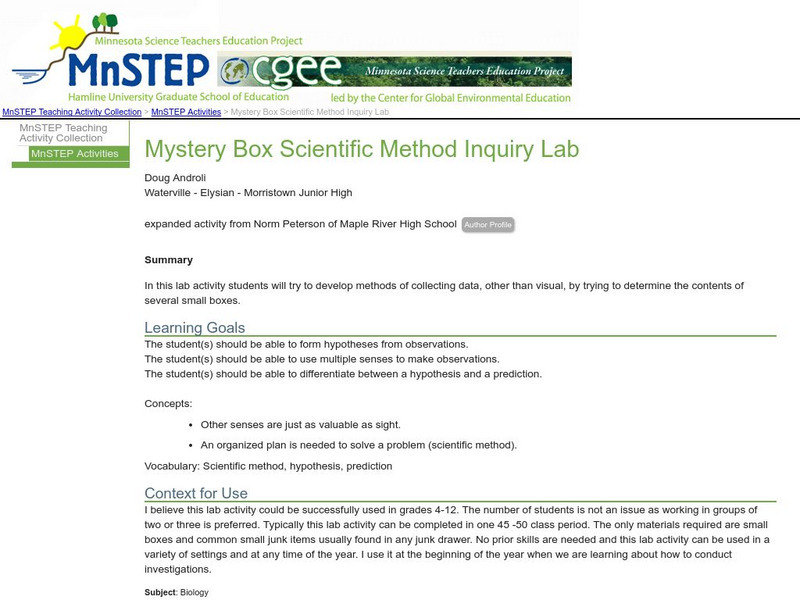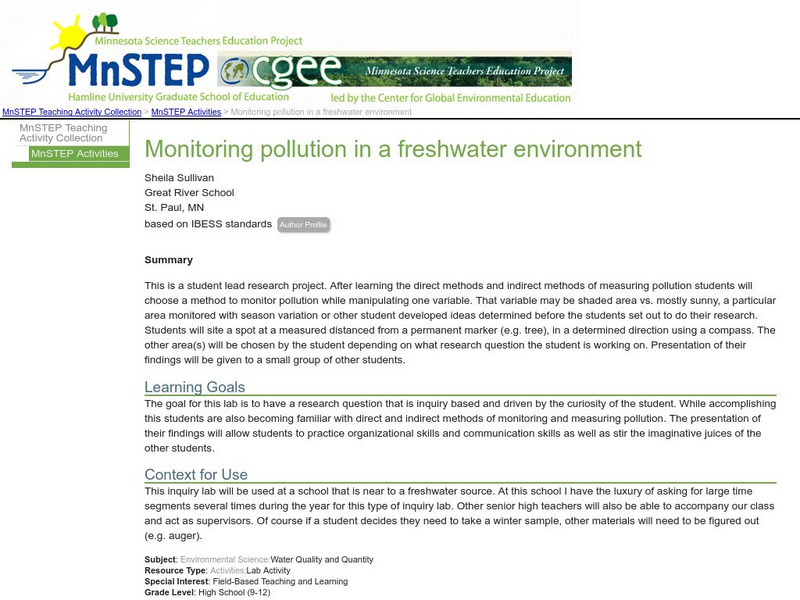Curated OER
2D Kinematics w/ String Racers
Students calculate the speed of string racers. In this physics lesson plan, students measure the time in several trials and get the average. They graph their results using a spreadsheet.
Curated OER
Point of View
Students participate in an inkblot test to discuss how what they see is different than their classmates. After viewing various artifacts, they write down what they believe the object is and then they are placed into a group to discuss...
Curated OER
Insulation and Buoyancy
Students predict whether their hands be warmer in ice water with or without a blubber mitten. They construct a blubber mitten using plastic, Crisco and compare their results with a control group. They observe how this affects buoyancy too.
Curated OER
Exploring With Photograms
Students observe the interaction between energy absorbed, reflected or transmitted through an object in a photochemical process with a classroom demonstration.
Curated OER
How Much Does a Bear Weigh?
Learners estimate how many children in their class it would take to equal the mass of one adult bear. They then weigh and record their measurement on a chart to check their estimate.
Curated OER
Polar Bear Cubs and ME
Students visit the following web site to find out the birth weights and lengths of polar bear cubs- Ask Jeeves for Kids. They then enter the information found at this site relating to the birth length and weight of polar bear cubs into a...
Curated OER
DNA-a Molecular Identity
Pupils explore about what DNA is and several different DNA typing techniques. They examine three different situations where DNA typing was used to carry out justice. Students also identify and evaluate different uses of DNA typing...
Curated OER
Archeological Thinking
Sixth graders review the differences between a historian and archaeolgists. At a recent archaeological dig site, they examine the artifacts and determine their usage. In groups, they are given a bag full of artifacts and write down what...
Curated OER
Plant Growth and Environment
Third graders bring to school various green plants and categorize them into plant leaves, stems, roots, and fruits. They answer the question, "How can you show there is starch in a plant?" and perform the iodine test and describe the...
Curated OER
Blood Business
Young scholars identify the different kinds of blood. In this biology lesson, students investigate the antigens, agglutinins and Rh factor using their own blood. They use Punnett squares to predict blood type of offspring.
Curated OER
Testing Soils for Garden Planting
Sixth graders collect soil samples and record the location of the samples by using GPS.
CK-12 Foundation
Ck 12: Scientific Inquiry
[Free Registration/Login may be required to access all resource tools.] Tutorial provides an understanding of the scientific method and how it is used to study the world around us. Students will learn about scientific inquiry and be able...
University of California
Wise: The Web Based Inquiry Science Environment
[Free Registration/Login Required] Enter a place where students and teachers can examine real world current science controversies. This resource allows teachers to choose and grade a project based on their curriculum. The students can...
Scholastic
Scholastic: Study Jams! Science: Scientific Inquiry: Scientific Methods
A video that explains the steps involved in the scientific method. Includes a karaoke song with lyrics, a quiz to test students' knowledge, and vocabulary definitions.
CK-12 Foundation
Ck 12: Scientific Method
[Free Registration/Login may be required to access all resource tools.] Describe how the Renaissance period in history changed the approach to science. Identify the steps of the scientific method. Differentiate between the independent...
Stanford University
Stanford Encyclopedia of Philosophy: Scientific Discovery
Scientific discovery is the process or product of successful scientific inquiry. Objects of discovery can be things, events, processes, causes, and properties as well as theories and hypotheses and their features (their explanatory...
McGraw Hill
Glencoe Biology: Methods of Science: Self Check Quiz
Take this self-checking, five question practice quiz over various methods of science.
American Chemical Society
American Chemical Society: Inquiry in Action: Teach Science Well
Online textbook reviews fundamentals of chemistry and physical science via slideshow presentations, notes, and videos. Materials for classroom activities engage students in inquiry-based, hands-on investigations covering molecular...
American Chemical Society
American Chemical Society: Inquiry in Action: Teach Science Well
Online textbook reviews fundamentals of chemistry and physical science via slideshow presentations, notes, and videos. Materials for classroom activities engage students in inquiry-based, hands-on investigations covering molecular...
ClassFlow
Class Flow: Scientific Investigation
[Free Registration/Login Required] This flipchart explains the steps of scientific investigation. It is intended to help build understanding of the scientific investigation process by providing definitions, opportunities for student...
Science Education Resource Center at Carleton College
Serc: Mystery Box Scientific Method Inquiry Lab
In this activity, students will use their senses to form hypotheses from observations. They will develop methods of collecting data, other than visual, by trying to determine the contents of several small boxes and should be able to...
Other
National Geographic: Jason Learning
[Free Registration/Login Required] Educators and students will enjoy visiting the JASON Project, a NASA and National Geographic cooperation which works to provide accurate and intriguing scientific knowledge for students.
Science Education Resource Center at Carleton College
Serc: Using Egg Drop Activity to Promote Critical Thinking and Analysis Skills
For this multi-lesson hands-on inquiry activity, students will develop their critical thinking skills by designing and constructing an apparatus that will permit an egg to survive a nine foot fall. Given limited materials, they will...
Science Education Resource Center at Carleton College
Serc: Monitoring Pollution in a Freshwater Environment
During this research project, students will choose either the direct method or the indirect method to monitor and measure pollution while manipulating one variable. They will develop a research question to work on and present their...






